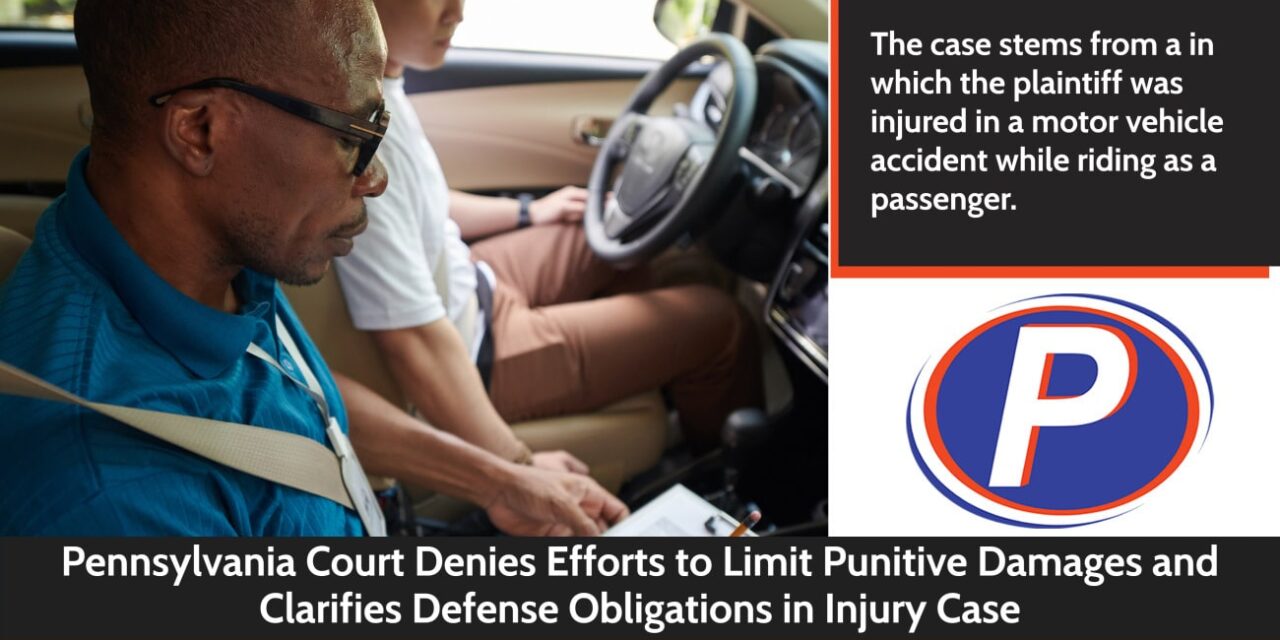A recent set of rulings from the Lycoming County Court of Common Pleas offers key takeaways for Pennsylvania drivers, injury victims, and attorneys navigating accident and insurance claims. The decisions reaffirm the rights of injury plaintiffs to seek punitive damages early in litigation and highlight important procedural standards for how defendants must present their defenses.
Case Background
The case stems from a in which the plaintiff was injured in a motor vehicle accident while riding as a passenger. The lawsuit alleges that one defendant failed to stop at a stop sign and another failed to maintain an assured clear distance, resulting in a collision that caused the plaintiff’s injuries.
The plaintiff brought negligence and recklessness claims against both drivers and included a request for punitive damages, an issue that became the focus of several rounds of preliminary objections filed by the defense.
Key Ruling: Punitive Damages Can Proceed Before Discovery
The defendant argued that the plaintiff’s complaint didn’t include enough detail to justify a punitive damages claim. However, the Court disagreed.
The judge held that it would be premature to strike a punitive damages claim before discovery, emphasizing that Pennsylvania’s civil rules require courts to “liberally construe” pleadings to achieve fairness and efficiency.
The Court explained that, unless a complaint clearly fails to state a valid legal claim, it should be allowed to move forward so that both sides can develop the facts through discovery.
In practical terms, this means that injury victims in Pennsylvania; particularly in motor vehicle injuries, are entitled to pursue punitive damages claims when there are allegations of reckless or grossly negligent behavior, even if all supporting evidence has not yet been uncovered.
Preliminary Objections: What They Mean for Plaintiffs and Defendants
In Pennsylvania, preliminary objections are a procedural tool that allows a party to challenge the legal sufficiency of another’s pleadings before a case progresses. However, courts are cautious about using them to strike claims early.
The Lycoming County Court reaffirmed this principle, citing established Pennsylvania precedent that says a demurrer (a form of preliminary objection) should only be sustained when a claim “clearly and without a doubt” fails to state a cause of action.
This ruling reinforces that injured parties deserve their day in court, and that challenges to damages or liability are better resolved after both sides have exchanged evidence.
Defense Obligations: Specificity Matters
Separate rulings in the same case addressed preliminary objections by the plaintiff to the defenses filed by the defendant and by their Insurance company.
The Court found that while some defenses were overly “boilerplate” repeating general statements of law without supporting facts, they were not prejudicial enough to strike entirely.
However, the judge directed the defendant to amend his pleading to clarify his claim that the plaintiff’s injuries were caused by “third parties.” The Court emphasized that under Pennsylvania’s fact-pleading standard, defendants must provide enough factual context to allow plaintiffs to understand the issues they must respond to.
In contrast, the Court allowed the insurer similarly broad legal defenses to stand, noting that although they contained little factual detail, they represented “accurate statements of Pennsylvania law” and did not unfairly disadvantage the plaintiff.
Why This Case Matters
For accident victims, this decision is a positive signal. It reinforces that:
- Punitive damages claims; even in automobile cases, should not be dismissed early simply for lack of specific proof.
- Insurance companies cannot hide behind procedural arguments to avoid defending claims on their merits.
- Defendants must clearly explain their affirmative defenses, especially when blaming other parties.
For personal injury attorneys, the rulings serve as a reminder to:
- Plead sufficient factual allegations of recklessness to preserve punitive damages claims;
- Challenge vague or unsupported defenses that fail to give notice of the issues in dispute;
- Use discovery to uncover conduct that could support higher damages or additional liability.
The Pisanchyn Law Firm’s Perspective
These rulings align with what the Pisanchyn Law Firm has long argued in Pennsylvania courts: injury victims deserve full access to justice not procedural shortcuts that benefit insurers.
When reckless drivers or negligent parties cause harm, punitive damages aren’t about punishment alone; they’re about deterrence and ensuring accountability. Likewise, clear, specific pleadings from both sides help streamline litigation and promote fair outcomes.
“Our system works best when both sides play by the same rules,” said Attorney Moyer. “This case reinforces that fairness begins with transparency and that victims shouldn’t lose their right to justice because of paperwork games.”
If You’ve Been Injured in a Car Accident
If you’ve been hurt in a crash involving multiple drivers or an uninsured or underinsured motorist, the Pisanchyn Law Firm can help you understand your rights under Pennsylvania law; including when punitive damages may apply and how to challenge insurance company defenses that limit your recovery.
Call 1-800-444-5309 or visit PisanchynLawFirm.com to schedule a free consultation.





